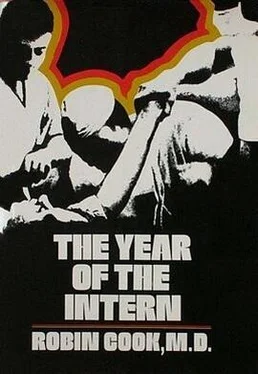Straus didn’t wait for an answer, but kept up his attack, moving closer to the table. It was a good thing he didn’t pause, because forty million seemed like a hell of a lot of people, and I wanted to question the figure. Besides, what did the figure mean, anyway, since it was common knowledge that plenty of Americans were literally starving for food? What good was sophisticated medical care when people didn’t get enough to eat? But the statistic got lost in the conversation as Straus continued.
“What we have is a bunch of street-vending doctors pushing around handcarts in the space age. And it’s the doctors’ fault!”
“Now, wait a second,” I said. I couldn’t let that generality go by. “Things might not be in the best possible shape, but there are a lot of fingers in the pie.
“Right, a lot of rich, greedy fingers. I mean when health care, as lousy as it is, takes seven per cent of your gross national product — that’s about seventy billion dollars a year — there are bound to be a lot of interested parties. But the fact remains that in the United States doctors have made the system, and they run it. They run the hospitals, the med schools, and most of the research. Most important, doctors control the supply of doctors.”
“What about the medical-insurance companies and drug firms?”
“Insurance companies? Well, their hands are not so clean, but, at any rate, they haven’t interfered in the doctor-patient relationship — I suppose out of fear of the AMA. I mean if one company pushed too hard, the AMA could conceivably refuse to honor and treat that company’s patients.”
“Oh, be reasonable, Straus.” I looked for support and got no commitment except from Jan, who nodded her head vigorously.
“So you don’t think the AMA would do such a thing?” asked Straus.
“I can’t imagine it.”
“Ho-ho, my friend. Are you aware of the glorious history of the AMA?”
“What do you have in mind? I know some things about the organization.” Actually, I was far from being an authority on the subject, both because it had been ignored in medical school and because — well, I just hadn’t been very interested in it.
“What do you mean, some things about the AMA? Are you a member?”
“Well, sort of. You know interns and residents can join at a reduced rate. So I did. But I haven’t done anything. I mean I haven’t gone to any meetings, or voted, or participated in any way.”
“There, that’s one of the problems. You are a member. You’re one of their statistics. They like to think that everybody is a member, only some are more active than others. The AMA claims it represents some two hundred thousand M.D.’s in the country, but do you know what?”
“What?” Straus definitely gave the impression of knowing what he was talking about.
“Their figures are out of whack. In lots of states, it’s rigged that in order to get hospital privileges a doctor must join the local medical society, and with it comes automatic and compulsory membership in the AMA. And do you think most of those doctors care or even think about what’s going on in the AMA? Well, dream on, because they don’t. They say to themselves, I’m too busy; I don’t have time. Or perhaps they have a feeling, although they don’t examine it very carefully, that the AMA is dirty politics. In that they are correct. But through their apathy the sweet old AMA stands up in Washington and says that it speaks for some two hundred thousand M.D.’s, who never contradict the allegation. To make matters worse, it not only speaks for them, but throws their money around as well. Do you realize the AMA budget is over twenty-five million dollars a year, paid in dues by the doctors who say they haven’t the time to find out what’s going on?”
“Okay, okay.” I had to interrupt him; he was getting too excited. Two of the residents on the other side of the table stood up and left, dropping their napkins onto their trays. It was after six, and I had to get to my packing. Yet I couldn’t ignore Straus. By now he was leaning toward me, literally in front of Jan, who had to sit bolt upright to accommodate him. I could see his eyes. He was a skinny, intense guy, anyway, and his eyes were burning.
“Straus, I’m not going to defend the AMA, but it is common knowledge that they’ve lifted the art of medicine out of the chaos it was in the nineteenth century. Before the Flexner report, around 1910, medical training was a joke, and it was the AMA that took on the burden of altering that.”
“Yeah, sure they did. But let me ask you, for what end?”
“What do you mean, what end? To rectify a sorry situation.”
“Perhaps, but also for their own ends.”
“What do you mean by that?”
“Just that they cut the number of medical schools and made them better — that I’ll agree to. But at the same time they locked up their control over the accreditation of medical schools. Translated, that means they have control over the supply of MD.’s and control over the curriculum. In other words, they have determined the social path through which potential doctors must pass, and they make damn sure that the students are nicely molded into the system.”
“Straus, you are a romantic. Are you sure you want to start an internship?”
“I want to be a doctor, and if there were any other way of getting there, I’d do it. But to change the subject, tell me, Peters, are you aware of the burden of history you’re assuming in entering the medical profession in America?”
“What are you driving at?” The last two doctors who had been sitting silently opposite us scraped back their chairs and departed. Only Straus, Jan, and I remained, leaning on a table littered with dirty dishes and soiled trays.
Undaunted, Straus continued. “The AMA has an almost unblemished record of failure in supporting, much less initiating, progressive social changes. For instance, the AMA was against the Public Health Service giving diphtheria shots and setting up V.D. clinics. And against Social Security, voluntary health insurance, and group practice. In fact, in the thirties the AMA labeled medical groups as Soviets!”
I sputtered, trying to say something, but I couldn’t get it out.
“A couple more points. Did you know the AMA fought against full-time salaried hospital chiefs, and, closer to home, even against federal low-interest loans to medical students?”
“What was that?” I had started tuning Straus out when he lapsed into his list of grievances, until the words “loans” and “students” connected in my head. I still owed quite a bit of money from my medical-school days. “They were against loans to medical students?”
“You better believe it.”
“Why?” That really did surprise me.
“Lord only knows! I guess it opened medicine up to the nonrich. But one of the most pathetic aspects of this scene is that after such reforms have been accepted by society and forced on the AMA, the AMA later tries to take credit for them. Makes you think of Orwell’s newspeak in 1984. I mean the whole crummy scene has got to change. I think the government has to do it.”
“Okay, Straus. Are you trying to tell me that after going all through those years of study, and all the years you still face, you’re going to be willing to work for the federal government? That’s what you seem to be suggesting.”
“Not necessarily. All I’m saying is that doctors have had the control, and they’ve screwed it up. Their responsibility is a lot broader than their solitary practices, treating a succession of individual patients. They’ve got to consider the totality of health care, including the treatment of the man in Harlem and the family in Appalachia — they’re as important as treating a chairman of the board in Harkness Pavilion. If doctors fail again, the government will have to take control and order the medical profession to accomplish what is needed. After all, adequate health care is the right of every citizen.”
Читать дальше












